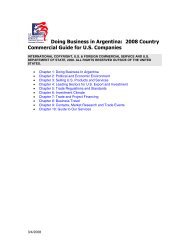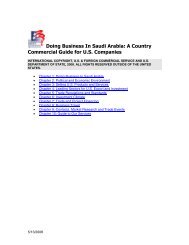Doing Business In (Insert Country Name Here) - BNA
Doing Business In (Insert Country Name Here) - BNA
Doing Business In (Insert Country Name Here) - BNA
You also want an ePaper? Increase the reach of your titles
YUMPU automatically turns print PDFs into web optimized ePapers that Google loves.
y restricting the sale of batteries and accumulators that contain mercury or cadmium<br />
(with an exemption for emergency and alarm systems, medical equipment and cordless<br />
power tools) and by promoting a high level of collection and recycling. It places the<br />
responsibility on producers to finance the costs associated with the collection, treatment,<br />
and recycling of used batteries and accumulators. The Directive also includes provisions<br />
on the labeling of batteries and their removability from equipment. EU Member States<br />
must implement the EU Directive into their national law by September 26, 2008. For<br />
more information, see our market research report:<br />
[http://www.buyusainfo.net/docs/x_8086174.pdf]<br />
REACH<br />
REACH is a major reform of EU chemicals policy that was adopted in December 2006<br />
and became national law in the 27 EU Member States in June 2007. Virtually every<br />
industrial sector, from automobiles to textiles, could be affected by the new policy.<br />
REACH stands for the "Registration, Evaluation and Authorization of Chemicals." As of<br />
June 1 2008, REACH will require all chemicals produced or imported into the EU in<br />
volumes above 1 ton per year to be registered with a central European Chemicals<br />
Agency (ECHA), including information on their properties, uses and safe ways of<br />
handling them. Most chemicals currently imported into the EU are eligible for preregistration<br />
which provides ECHA with basic information on the substance and allows<br />
the continued imports until a later registration deadline. ECHA will accept preregistrations<br />
from 1 June 2008 until 1 December 2008. US companies should take<br />
advantage of the pre-registration period if possible. The full registration period for<br />
chemicals which are pre-registered ranges from three to eleven years depending on the<br />
volume of the substance and its hazard properties. Substances not pre-registered must<br />
be registered to stay on the market. Chemicals of very high concern, like carcinogens,<br />
will need an authorization for use in the EU. U.S. exporters to Europe should carefully<br />
consider this piece of EU environmental legislation. For more information, see the CSEU<br />
REACH webpage at: [http://www.buyusa.gov/europeanunion/reach.html]<br />
WEEE & RoHS<br />
EU rules on waste electrical and electronic equipment (WEEE), while not requiring<br />
specific customs or import paperwork, may entail a financial obligation for U.S.<br />
exporters. They require U.S. exporters to register the products with a national WEEE<br />
authority, or arrange for this to be done by a local partner. Similarly, related rules for<br />
EEE restricting the use of the hazardous substances (RoHS) lead, cadmium, mercury,<br />
hexavalent chromium, PBBs, and PBDEs, do not entail customs or importation<br />
paperwork. However, U.S. exporters may be asked by a European RoHS enforcement<br />
authority or by a customer to provide evidence of due diligence in compliance with the<br />
substance bans on a case-by-case basis. U.S. exporters seeking more information on<br />
WEEE and RoHS regulations should visit:<br />
[http://www.buyusa.gov/europeanunion/weee.html]<br />
Agricultural Documentation<br />
Phytosanitary Certificates: Phytosanitary certificates are required for most fresh fruits,<br />
vegetables, and other plant materials.<br />
2/15/2008 <strong>Country</strong> Commercial Guide for France 75<br />
INTERNATIONAL COPYRIGHT, U.S. & FOREIGN COMMERCIAL SERVICE AND U.S. DEPARTMENT OF STATE,<br />
© 2007. ALL RIGHTS RESERVED OUTSIDE OF THE UNITED STATES.












